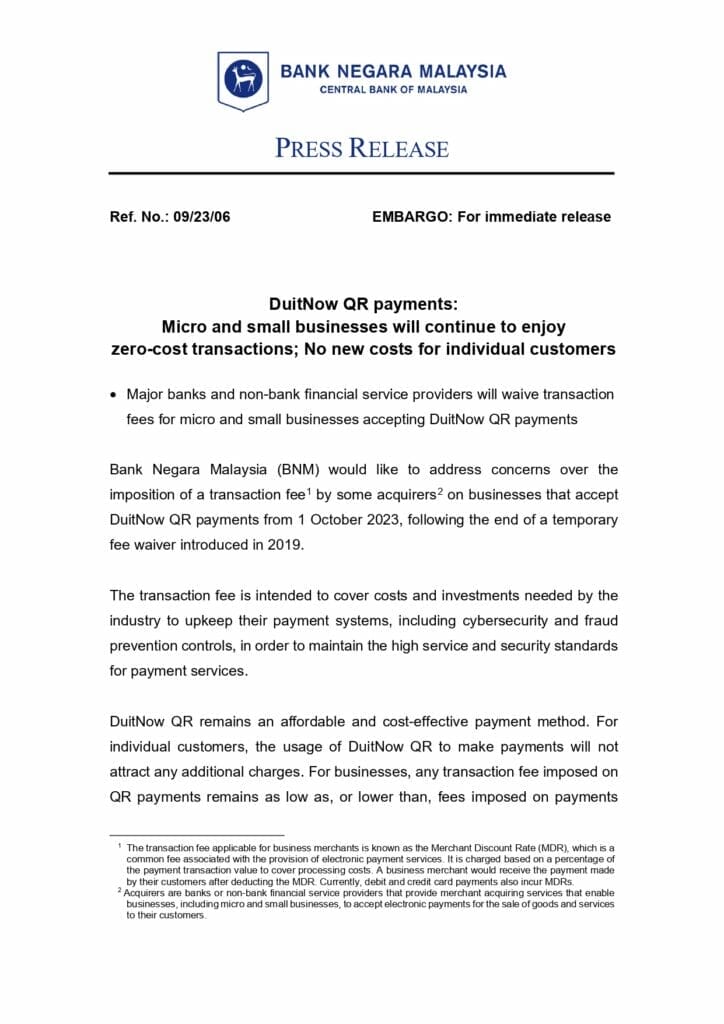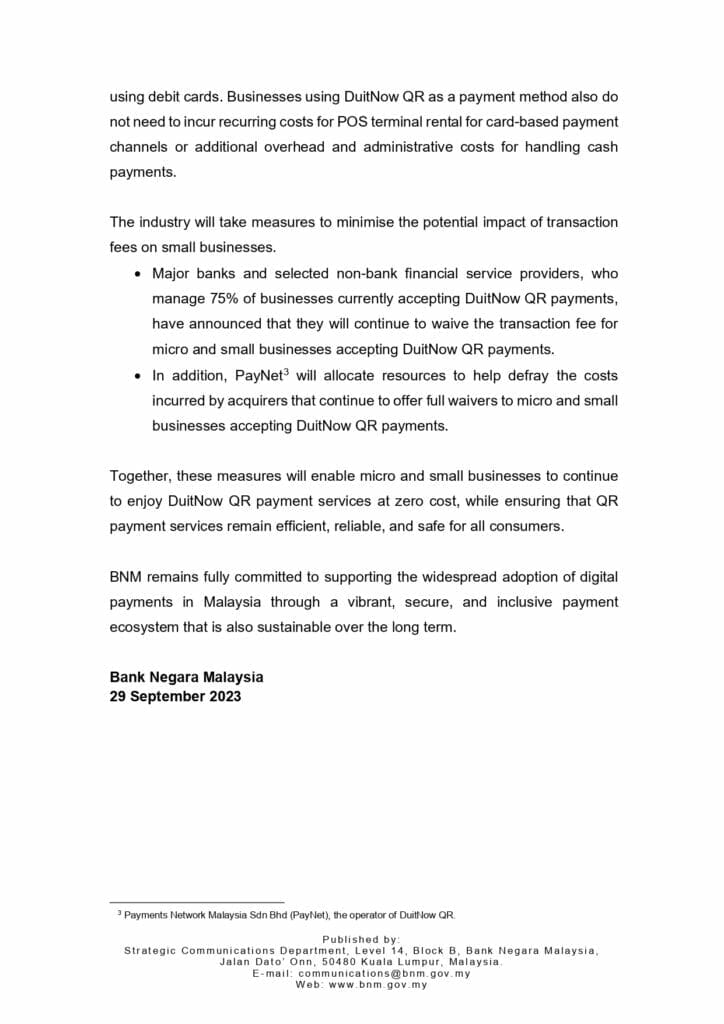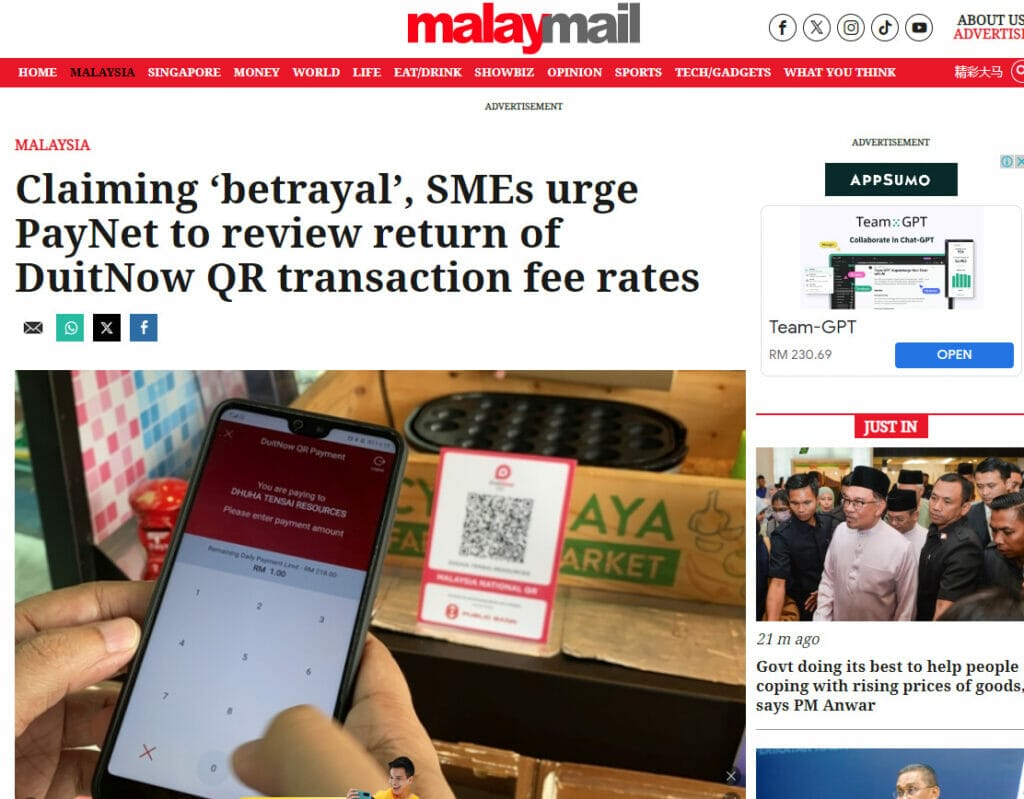Latest Update : Bank Negara Malaysia (BNM) announced that banks will continue to waive the DuitNow QR transaction fee for small businesses. The National Action Council on Cost of Living (NACCOL) is set to discuss the matter of the DuitNow QR payment fee: Refer Ringgitplus 02 Oct 2023
The Star reported that the Prime Minister will be chairing a special meeting on the imposition of a transaction fee for payments via DuitNow QR. (Last updated: 10/1/2023)


Unveiling the DuitNow QR Fee Reinstatement
Recent updates regarding the reintroduction of transaction fee rates for DuitNow QR payments have caught the attention of SME communities in Malaysia. The move has been labelled as a ‘betrayal’ by many, considering the substantial investments made by merchants to encourage the use of a unified QR code payment system among customers.
Merchant Discount Rate (MDR) Reintroduction
The Merchant Discount Rate (MDR) for DuitNow QR payments, a fee determined as a percentage of the transaction value, had initially been waived to promote adoption during its launch in 2019. However, this waiver is set to expire on 1 November 2023. The SME sector views this change as an additional financial burden, especially amidst the economic challenges brought forth by the COVID-19 pandemic.
Economic Implications on SMEs
SMEs, being a significant chunk of Malaysia’s economy, fear that these additional costs could adversely impact their operations and overall profitability. Critics also believe that the re-imposition of QR payment charges could hamper the nation’s digitalization efforts, potentially dissuading businesses from continuing the use of digital payment platforms.
Calls for Reconsideration
Responding to these concerns, there have been calls for Payments Network Malaysia Sdn Bhd (PayNet), the entity overseeing DuitNow QR, to revisit its decision. It is argued that maintaining the MDR waiver would cater to the interests of both SMEs and consumers.
Future of DuitNow QR Payments
While the decision to reintroduce transaction fee rates for DuitNow QR payments may have been targeted at generating revenue, it has indeed evoked substantial concerns among SMEs. It now falls upon PayNet to address these concerns and possibly find a compromise that balances revenue generation with the interests of SMEs and consumers.
DuitNow QR: A Closer Look
DuitNow QR, established under the purview of PayNet and supported by Bank Negara Malaysia’s Interoperable Credit Transfer Framework, stands as Malaysia’s National QR Standard. Here are some notable features of DuitNow QR:
- Interoperability: Its interoperability allows any compliant QR Code to accept payments from all participating Banks and e-Wallets.
- Ease of Use: To utilize DuitNow QR, customers merely need to launch their preferred Mobile Banking or eWallet app, scan the merchant’s DuitNow QR, confirm payment details, and execute the payment.
- Operator: DuitNow QR is operated by Payments Network Malaysia (PayNet), Malaysia’s premier payments network and central infrastructure for financial markets.
- Merchant Discount Rate (MDR): The MDR is levied based on a percentage of the transaction value, with current applicability to debit and credit card payments, while an ongoing MDR waiver exists for QR payments.
- MDR Waiver: Introduced to boost usage, the MDR waiver during the QR payment introduction phase in 2019 will, however, come to a halt from 1 November 2023.

For a more nuanced understanding, consider perusing:
- “Claiming ‘betrayal’, SMEs urge PayNet to review return of DuitNow QR transaction fee rates | Malay Mail”
- “Charge on DuitNow QR payments will burden SME sector, says group | The Star”
- “QR payment charges regressive, detrimental to digitalisation efforts | The Star”




